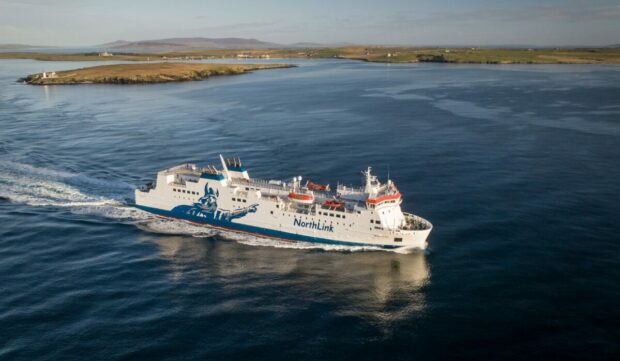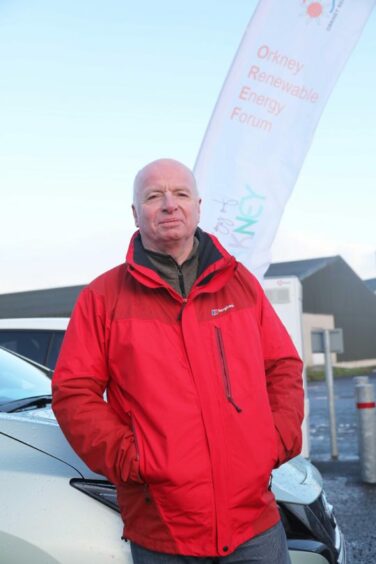More electric vehicle drivers are expected to visit Orkney and Shetland following a long-running campaign aimed at installing charge points on ferries.
The Electric Vehicle Association (EVA) Scotland has been pressing operators on longer routes to provide onboard charge points as the number of electric vehicles grows.
While ferry companies have been able to install charging points, new guidance from the Maritime and Coastguard Agency (MCA) is expected to help encourage the move.
It is hoped slow-speed chargers can now be installed on NorthLink Ferries vessels between Aberdeen, Orkney and Shetland.
This could provide a major boost for tourism with increasing numbers of visitors to the islands driving electric vehicles.
Four-year campaign for EV chargers
Neil Kermode is chairman of the Orkney Renewable Energy Forum and a director of EVA Scotland.
He said: “We have been trying to get chargers on these ferries for the last four years.
“The main reason for this being that northbound ferries from Aberdeen arrive in Orkney at 11pm.
“We were keen that tired drivers would be able to have enough charge in their cars to drive to their homes or hotels without needing to try to find a charge point at midnight.
“When we first contacted the MCA about this in 2018 there were very few EVs about. The missing guidance was not on their priority list. They made it clear that was not going to change.
“In the intervening years, EV sales have gone up exponentially, with EVs becoming increasingly common on our roads and therefore on our ferries.
“The need to make sure the carriage of EVs was considered had become increasingly important.
“The issue of the MCA guidance is therefore heartily welcomed by both EVA Scotland and the Orkney Renewable Energy Forum.
“This important step by the MCA will help Orkney be just that little bit more ready for the EV revolution already under way.”
Growing number of electric vehicles
He said Northlink Ferries has installed chargers at their terminals, as have other operators. He feels all ferry ports should have charge points.
However, arriving early enough to be sure of an adequate charge could become fraught as numbers of EV drivers increase.
“With the cars sitting idle on ships for up to five hours while on passage, it seemed to us like a good time to provide EV charging to those really in need.”
This important step by the MCA will help Orkney be just that little bit more ready for the EV revolution already underway.”
— Neil Kermode
Mr Kermode said the new guidance allows charging on short ferry routes too.
But he added this is not being recommended because the source of the electricity on ships is presently a diesel engine powering the vessel.
For short crossings, the cars would not get enough charge to make the process worthwhile.
A spokesman for Serco NorthLink Ferries said: “Following recent guidance from the Maritime and Coastguard Agency, we are assessing the risks associated with the fitment and use of EV charging onboard to inform decision making.”
The MCA guidance – called MGN653 – goes beyond the question of charging and looks at overall fire safety of electric vehicles on passenger ferries.
It says there are currently few requirements specific to the charging of EVs onboard UK vessels.
“However, noting the increasing popularity of the electric vehicle, it has become apparent that there is a potential for both the users of these vehicles and the operators of vessels to charge vehicles onboard”.
It adds: “The limited capacity for charging on board and the charging fuel source of the ro-ro ferry, normally marine fuel oil, should be considered when making decisions on charging of electric vehicles, and may partly negate the environmental benefits of electric vehicles.
Guidance on charging safely
“Charging operations in the port before and/or after the sea-journey, may be more efficient, environmentally friendly, cost effective and have a lower risk profile, than charging onboard, even if that would be more convenient for the vehicle owners”.
A MCA spokeswoman said: “There have never been any MCA-mandated restrictions on allowing electric charging points for vehicles onboard ferries.
“The publication of MGN653 has introduced guidance on how to do it safely, as ferry operators may wish to consider the installation of EV chargers onboard vessels and offering charging options to passengers.”
EVA Scotland says it expected only a few 6kW charger bays will be needed on the NorthLink ferries.
They expect a fee is likely.
Related – is the future electric?
Ember looks to spark up Inverness electric bus services and create 25 jobs
£30m funding package to support move to electric vehicles
Tourism firms urged to install electric vehicle charging points to boost business
Are you interested in more exclusive and breaking Highland and Islands news from the P&J? If so, why not join our dedicated Facebook page HERE



Conversation